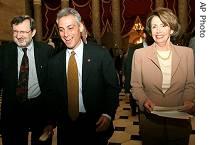-
(单词翻译:双击或拖选)
Capitol Hill
23 April 2007
House and Senate negotiators have agreed on a military funding bill containing a timetable for withdrawing U.S. forces from Iraq. VOA's Dan Robinson reports, approval of a conference report for the Iraq-Afghanistan measure moves it to the full House and later the Senate for approval, but the legislation still faces a certain veto by President Bush.
 |
| From left: Representatives David Obey, Rahm Emanuel and Nancy Pelosi, 23 Apr 2007 |
With $95 billion of the $120 billion in the bill going for military needs and the rest for various domestic purposes, the legislation now goes to the House floor, and then to the Senate, and from there to the president.
Congressman2 David Obey began Monday's meeting by addressing the president's threat of a veto, saying that the real significance will be in sending a clear message about the scrutiny3 the president's war funding requests will get from the Democratic-controlled Congress:
"What is important is not so much the exact language of whatever instrument it is we send to the president," said David Obey. "What is important is the unity4 that we express in doing so, so that people understand that we are going to be coming back at this issue again and again."
Republicans focused mainly on the need to approve final bill quickly, and get it to the president so he can veto it, returning the measure to Capitol Hill where it will have to be revised.
Congressman Jerry Lewis also conveyed the Republican contention5 that Democrats6 are attempting to tie the hands of the president and military commanders:
"This legislation ought to focus on our troops," said Jerry Lewis. "It ought to focus on providing those in harm's way with the resources they need to complete their mission successfully. It ought to respect, not micro-manage our combatant commanders in whom we place the ultimate responsibility for prosecuting8 military actions."
The measure that goes to the president, probably by week's end, would set a goal of a phased withdrawal9 of U.S. troops to begin no later than October 1 of this year, with a non-mandatory10 goal of removing all combat forces from Iraq by April 1 of 2008.
House Democrats agreed to adopt Senate language that is softer than a bill the House approved many weeks ago that proposed a mandatory withdrawal by October 2008.
The Democratic plan would largely limit U.S. troops to training Iraqi security forces, protecting remaining U.S. forces, and conducting targeted counter-terrorism operations.
| President Bush makes a statement on the war in Iraq in White House, 23 Apr 2007. With him is Gen. David Petraeus, commander of the multinational force in Iraq |
"An artificial timetable of withdrawal would say to an enemy, 'just wait them out.' It would say to the Iraqis, 'do not do hard things necessary to achieve our objectives,' and it would be discouraging for our troops," said President Bush.
The president acknowledged that Iraq continues to be plagued by violence, including what he termed "horrific bombings," but asserts that the military build-up of U.S. forces referred to many as a surge, is showing some signs of progress.
But in a Washington speech Monday, Senate Majority Leader Harry13 Reid said the president is wrong, and reserved some of his sharpest criticism for the Iraqi government:
"Despite our surge in troops, and spending, they have failed to take meaningful steps toward achieving them [benchmarks for progress]," noted14 Harry Reid. "Militias15 have not disbanded and continue to cause terror and now the Iraqi government, once the Bush administration's greatest pride, stands on the brink16 of chaos17."
Without enough support to override18 a veto, Democrats will have to recraft the measure to make it acceptable for the president, and ensure that funds can move to military forces on the ground in Iraq and Afghanistan.
In addition to setting the goal of withdrawing from Iraq, the legislation in its current form also limits the amount of time troops can be deployed19 to Iraq, and requires that military units be fully7 battle-ready, but allows the president to waive20 these requirements if he provides justifications21 to Congress.
 收听单词发音
收听单词发音
1
relatively

|
|
| adv.比较...地,相对地 | |
参考例句: |
|
|
|
2
Congressman

|
|
| n.(美)国会议员 | |
参考例句: |
|
|
|
3
scrutiny

|
|
| n.详细检查,仔细观察 | |
参考例句: |
|
|
|
4
unity

|
|
| n.团结,联合,统一;和睦,协调 | |
参考例句: |
|
|
|
5
contention

|
|
| n.争论,争辩,论战;论点,主张 | |
参考例句: |
|
|
|
6
democrats

|
|
| n.民主主义者,民主人士( democrat的名词复数 ) | |
参考例句: |
|
|
|
7
fully

|
|
| adv.完全地,全部地,彻底地;充分地 | |
参考例句: |
|
|
|
8
prosecuting

|
|
| 检举、告发某人( prosecute的现在分词 ); 对某人提起公诉; 继续从事(某事物); 担任控方律师 | |
参考例句: |
|
|
|
9
withdrawal

|
|
| n.取回,提款;撤退,撤军;收回,撤销 | |
参考例句: |
|
|
|
10
mandatory

|
|
| adj.命令的;强制的;义务的;n.受托者 | |
参考例句: |
|
|
|
11
multinational

|
|
| adj.多国的,多种国籍的;n.多国籍公司,跨国公司 | |
参考例句: |
|
|
|
12
disastrous

|
|
| adj.灾难性的,造成灾害的;极坏的,很糟的 | |
参考例句: |
|
|
|
13
harry

|
|
| vt.掠夺,蹂躏,使苦恼 | |
参考例句: |
|
|
|
14
noted

|
|
| adj.著名的,知名的 | |
参考例句: |
|
|
|
15
militias

|
|
| n.民兵组织,民兵( militia的名词复数 ) | |
参考例句: |
|
|
|
16
brink

|
|
| n.(悬崖、河流等的)边缘,边沿 | |
参考例句: |
|
|
|
17
chaos

|
|
| n.混乱,无秩序 | |
参考例句: |
|
|
|
18
override

|
|
| vt.不顾,不理睬,否决;压倒,优先于 | |
参考例句: |
|
|
|
19
deployed

|
|
| (尤指军事行动)使展开( deploy的过去式和过去分词 ); 施展; 部署; 有效地利用 | |
参考例句: |
|
|
|
20
waive

|
|
| vt.放弃,不坚持(规定、要求、权力等) | |
参考例句: |
|
|
|
21
justifications

|
|
| 正当的理由,辩解的理由( justification的名词复数 ) | |
参考例句: |
|
|
|















